coolant temperature MAZDA MODEL 3 HATCHBACK 2005 Owner's Manual (in English)
[x] Cancel search | Manufacturer: MAZDA, Model Year: 2005, Model line: MODEL 3 HATCHBACK, Model: MAZDA MODEL 3 HATCHBACK 2005Pages: 322, PDF Size: 4.7 MB
Page 135 of 322
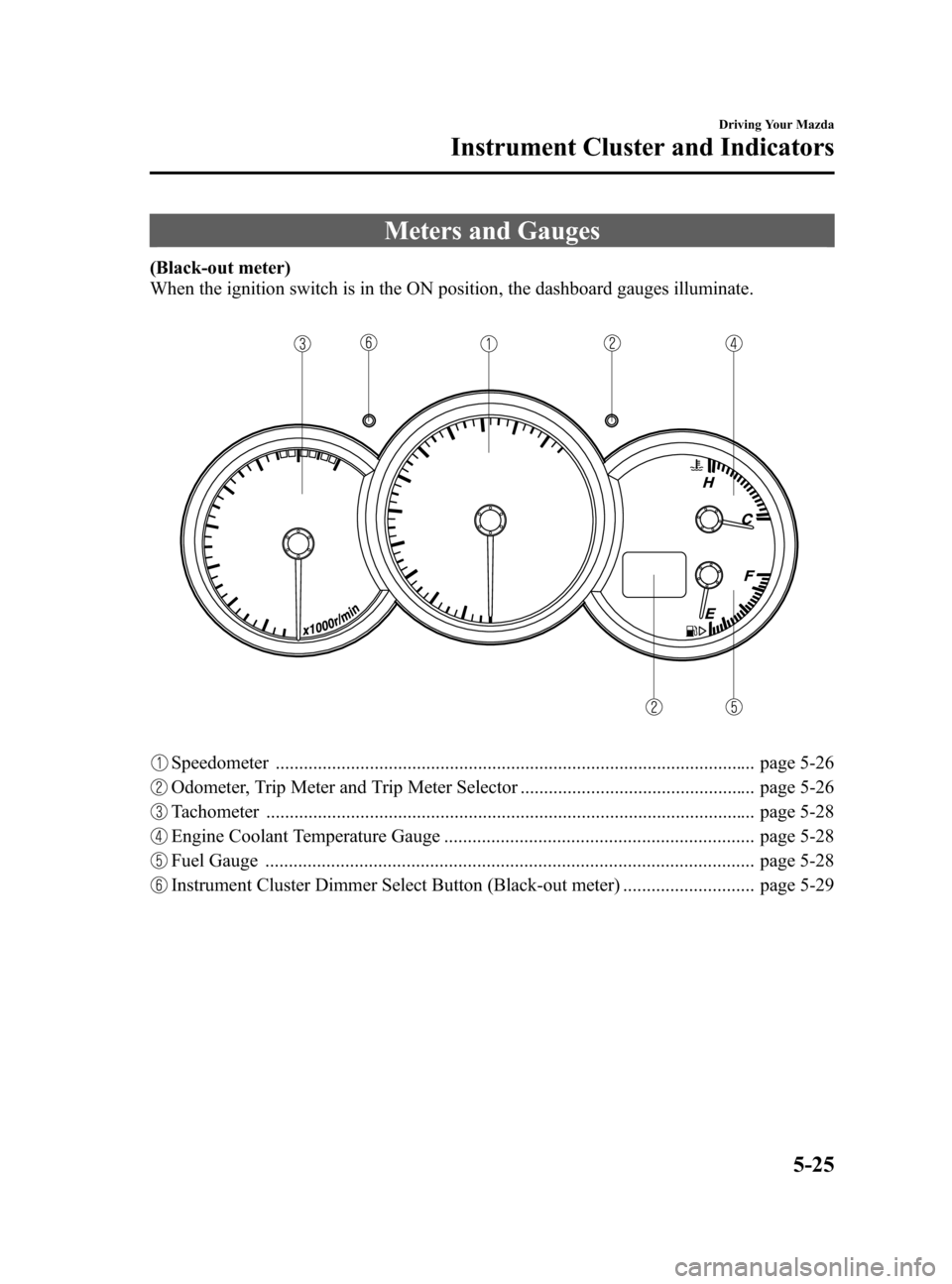
Black plate (135,1)
Meters and Gauges
(Black-out meter)
When the ignition switch is in the ON position, the dashboard gauges illuminate.
Speedometer ...................................................................................................... page 5-26
Odometer, Trip Meter and Trip Meter Selector .................................................. page 5-26
Tachometer ........................................................................................................ page 5-28
Engine Coolant Temperature Gauge .................................................................. page 5-28
Fuel Gauge ........................................................................................................ page 5-28
Instrument Cluster Dimmer Select Button (Black-out meter) ............................ page 5-29
Driving Your Mazda
Instrument Cluster and Indicators
5-25
Mazda3_8T97-EC-04J_Edition1 Page135
Saturday, September 25 2004 2:10 PM
Form No.8T97-EC-04J
Page 138 of 322
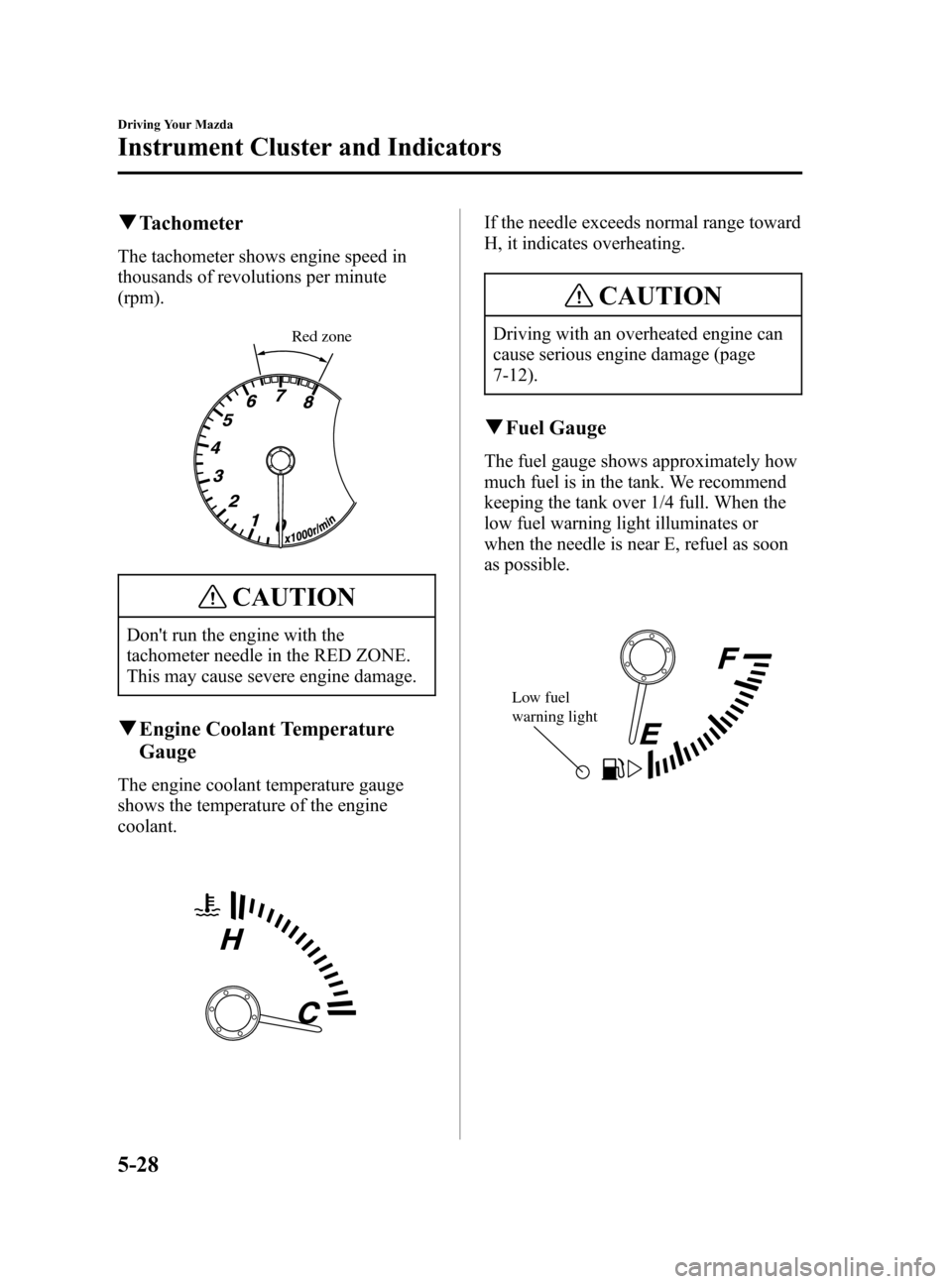
Black plate (138,1)
qTachometer
The tachometer shows engine speed in
thousands of revolutions per minute
(rpm).
Red zone
CAUTION
Don't run the engine with the
tachometer needle in the RED ZONE.
This may cause severe engine damage.
qEngine Coolant Temperature
Gauge
The engine coolant temperature gauge
shows the temperature of the engine
coolant.
If the needle exceeds normal range toward
H, it indicates overheating.
CAUTION
Driving with an overheated engine can
cause serious engine damage (page
7-12).
qFuel Gauge
The fuel gauge shows approximately how
much fuel is in the tank. We recommend
keeping the tank over 1/4 full. When the
low fuel warning light illuminates or
when the needle is near E, refuel as soon
as possible.
Low fuel
warning light
5-28
Driving Your Mazda
Instrument Cluster and Indicators
Mazda3_8T97-EC-04J_Edition1 Page138
Saturday, September 25 2004 2:10 PM
Form No.8T97-EC-04J
Page 220 of 322
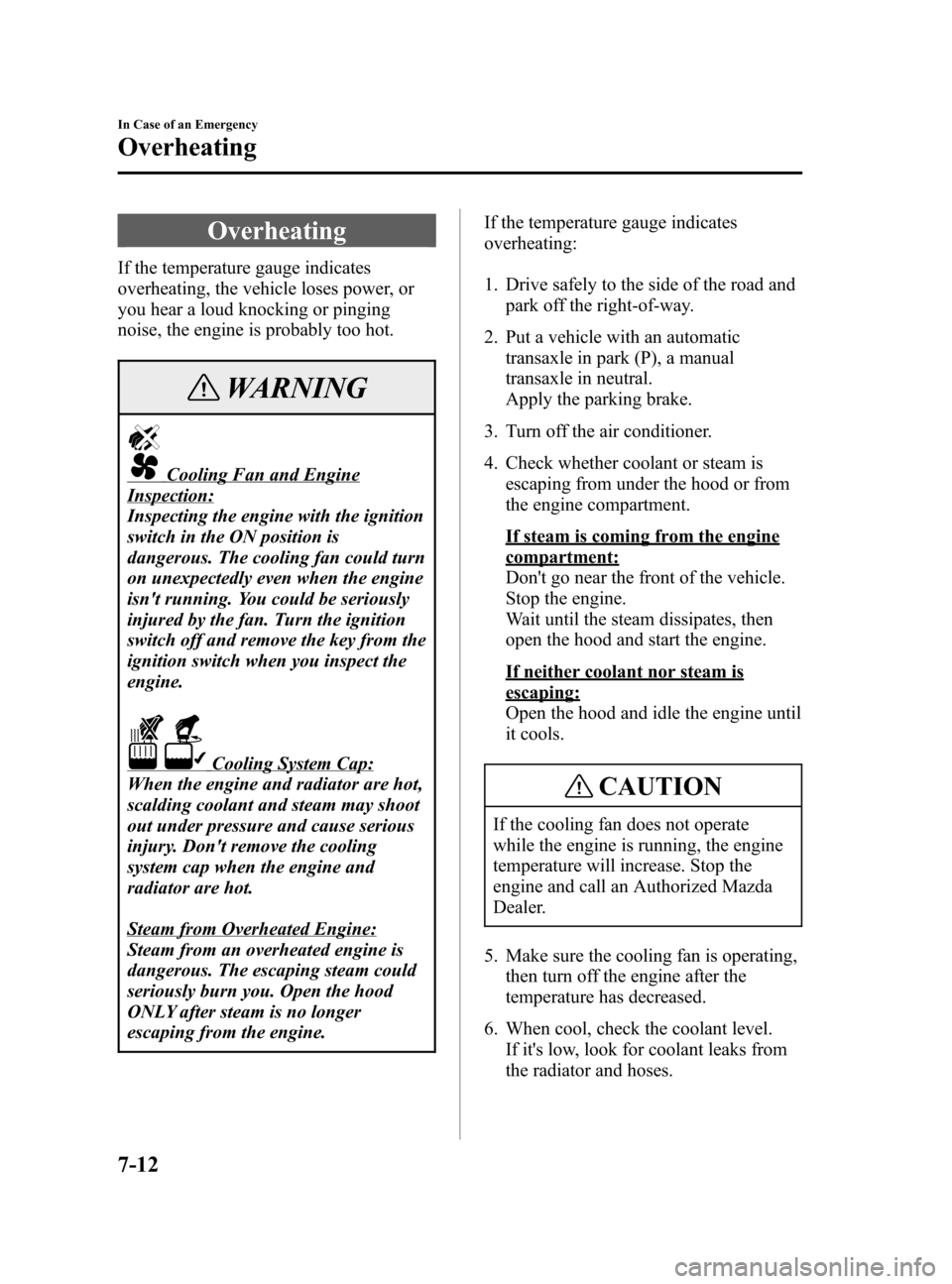
Black plate (220,1)
Overheating
If the temperature gauge indicates
overheating, the vehicle loses power, or
you hear a loud knocking or pinging
noise, the engine is probably too hot.
WARNING
Cooling Fan and Engine
Inspection:
Inspecting the engine with the ignition
switch in the ON position is
dangerous. The cooling fan could turn
on unexpectedly even when the engine
isn't running. You could be seriously
injured by the fan. Turn the ignition
switch off and remove the key from the
ignition switch when you inspect the
engine.
Cooling System Cap:
When the engine and radiator are hot,
scalding coolant and steam may shoot
out under pressure and cause serious
injury. Don't remove the cooling
system cap when the engine and
radiator are hot.
Steam from Overheated Engine:
Steam from an overheated engine is
dangerous. The escaping steam could
seriously burn you. Open the hood
ONLY after steam is no longer
escaping from the engine.If the temperature gauge indicates
overheating:
1. Drive safely to the side of the road and
park off the right-of-way.
2. Put a vehicle with an automatic
transaxle in park (P), a manual
transaxle in neutral.
Apply the parking brake.
3. Turn off the air conditioner.
4. Check whether coolant or steam is
escaping from under the hood or from
the engine compartment.
If steam is coming from the engine
compartment:
Don't go near the front of the vehicle.
Stop the engine.
Wait until the steam dissipates, then
open the hood and start the engine.
If neither coolant nor steam is
escaping:
Open the hood and idle the engine until
it cools.
CAUTION
If the cooling fan does not operate
while the engine is running, the engine
temperature will increase. Stop the
engine and call an Authorized Mazda
Dealer.
5. Make sure the cooling fan is operating,
then turn off the engine after the
temperature has decreased.
6. When cool, check the coolant level.
If it's low, look for coolant leaks from
the radiator and hoses.
7-12
In Case of an Emergency
Overheating
Mazda3_8T97-EC-04J_Edition1 Page220
Saturday, September 25 2004 2:15 PM
Form No.8T97-EC-04J
Page 246 of 322
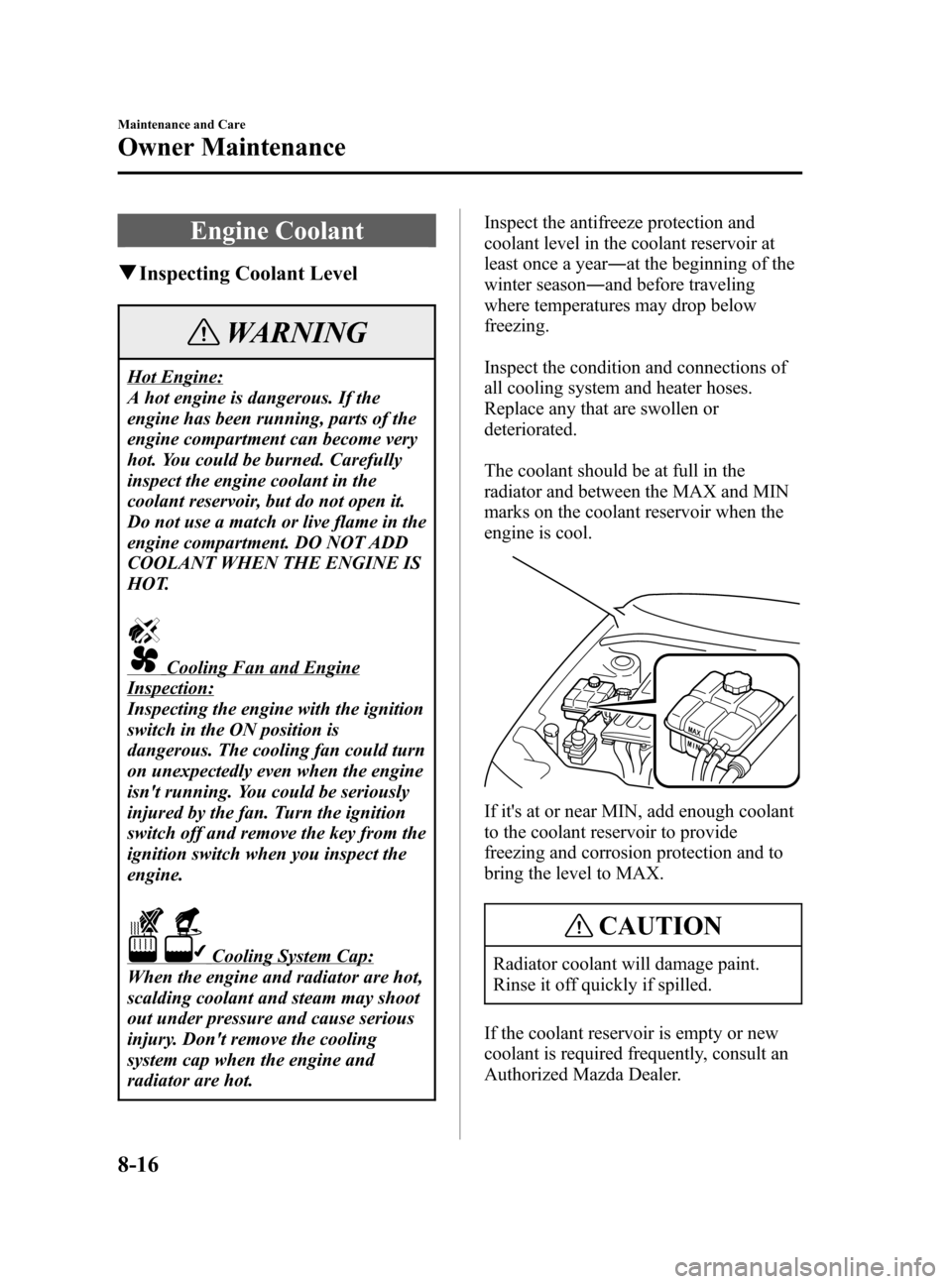
Black plate (246,1)
Engine Coolant
qInspecting Coolant Level
WARNING
Hot Engine:
A hot engine is dangerous. If the
engine has been running, parts of the
engine compartment can become very
hot. You could be burned. Carefully
inspect the engine coolant in the
coolant reservoir, but do not open it.
Do not use a match or live flame in the
engine compartment. DO NOT ADD
COOLANT WHEN THE ENGINE IS
HOT.
Cooling Fan and Engine
Inspection:
Inspecting the engine with the ignition
switch in the ON position is
dangerous. The cooling fan could turn
on unexpectedly even when the engine
isn't running. You could be seriously
injured by the fan. Turn the ignition
switch off and remove the key from the
ignition switch when you inspect the
engine.
Cooling System Cap:
When the engine and radiator are hot,
scalding coolant and steam may shoot
out under pressure and cause serious
injury. Don't remove the cooling
system cap when the engine and
radiator are hot.Inspect the antifreeze protection and
coolant level in the coolant reservoir at
least once a year―at the beginning of the
winter season―and before traveling
where temperatures may drop below
freezing.
Inspect the condition and connections of
all cooling system and heater hoses.
Replace any that are swollen or
deteriorated.
The coolant should be at full in the
radiator and between the MAX and MIN
marks on the coolant reservoir when the
engine is cool.
If it's at or near MIN, add enough coolant
to the coolant reservoir to provide
freezing and corrosion protection and to
bring the level to MAX.
CAUTION
Radiator coolant will damage paint.
Rinse it off quickly if spilled.
If the coolant reservoir is empty or new
coolant is required frequently, consult an
Authorized Mazda Dealer.
8-16
Maintenance and Care
Owner Maintenance
Mazda3_8T97-EC-04J_Edition1 Page246
Saturday, September 25 2004 2:16 PM
Form No.8T97-EC-04J
Page 248 of 322

Black plate (248,1)
4. Drain the system completely. Insert and
tighten the plug. Add as much
ethylene-glycol-based coolant mixture
and water as necessary to provide
freezing and corrosion protection.
5. In extremely cold climates, add the
mixture percentage recommended in
the coolant mixture percentage table.
6. Run the engine at idle with the cooling
system cap off. Slowly add additional
coolant if necessary.
7. At this point, wait until the engine
reaches normal operating temperature;
then depress the accelerator two or
three times. Add more coolant, if
necessary, until the system is full.
8. Install the cooling system cap. Inspect
all connections for leaks. Inspect the
level in the coolant reservoir one more
time.Brake/Clutch Fluid
qInspecting Brake/Clutch Fluid
Level
The brakes and clutch draw fluid from the
same reservoir.
Inspect the fluid level in the reservoir
regularly. It should be kept at MAX.
The level normally drops with
accumulated distance, a condition
associated with wear of brake and clutch
linings. If it is excessively low, have the
brake/clutch system inspected by an
Authorized Mazda Dealer.
8-18
Maintenance and Care
Owner Maintenance
Mazda3_8T97-EC-04J_Edition1 Page248
Saturday, September 25 2004 2:16 PM
Form No.8T97-EC-04J
Page 319 of 322
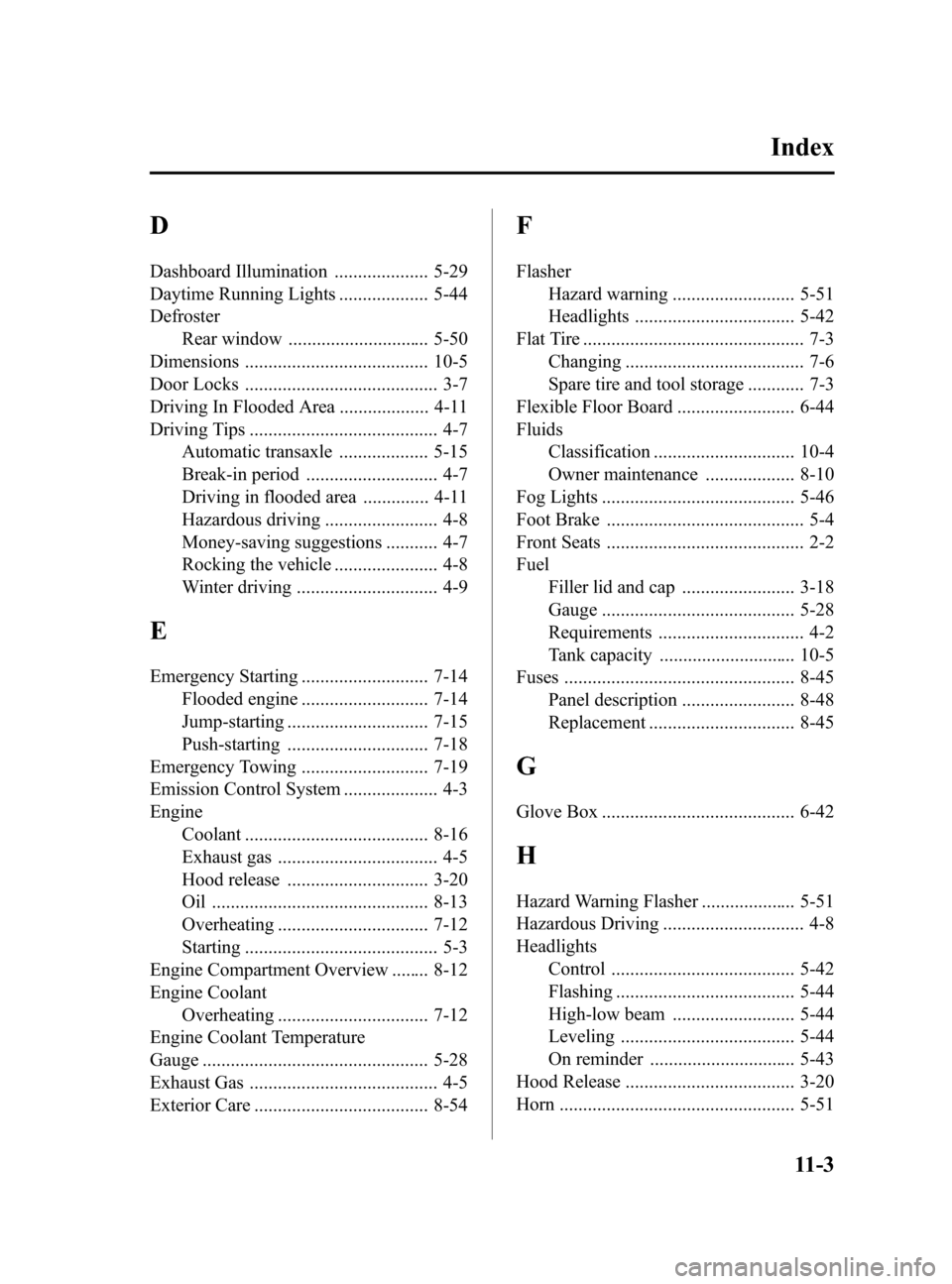
Black plate (319,1)
D
Dashboard Illumination .................... 5-29
Daytime Running Lights ................... 5-44
Defroster
Rear window .............................. 5-50
Dimensions ....................................... 10-5
Door Locks ......................................... 3-7
Driving In Flooded Area ................... 4-11
Driving Tips ........................................ 4-7
Automatic transaxle ................... 5-15
Break-in period ............................ 4-7
Driving in flooded area .............. 4-11
Hazardous driving ........................ 4-8
Money-saving suggestions ........... 4-7
Rocking the vehicle ...................... 4-8
Winter driving .............................. 4-9
E
Emergency Starting ........................... 7-14
Flooded engine ........................... 7-14
Jump-starting .............................. 7-15
Push-starting .............................. 7-18
Emergency Towing ........................... 7-19
Emission Control System .................... 4-3
Engine
Coolant ....................................... 8-16
Exhaust gas .................................. 4-5
Hood release .............................. 3-20
Oil .............................................. 8-13
Overheating ................................ 7-12
Starting ......................................... 5-3
Engine Compartment Overview ........ 8-12
Engine Coolant
Overheating ................................ 7-12
Engine Coolant Temperature
Gauge ................................................ 5-28
Exhaust Gas ........................................ 4-5
Exterior Care ..................................... 8-54
F
Flasher
Hazard warning .......................... 5-51
Headlights .................................. 5-42
Flat Tire ............................................... 7-3
Changing ...................................... 7-6
Spare tire and tool storage ............ 7-3
Flexible Floor Board ......................... 6-44
Fluids
Classification .............................. 10-4
Owner maintenance ................... 8-10
Fog Lights ......................................... 5-46
Foot Brake .......................................... 5-4
Front Seats .......................................... 2-2
Fuel
Filler lid and cap ........................ 3-18
Gauge ......................................... 5-28
Requirements ............................... 4-2
Tank capacity ............................. 10-5
Fuses ................................................. 8-45
Panel description ........................ 8-48
Replacement ............................... 8-45
G
Glove Box ......................................... 6-42
H
Hazard Warning Flasher .................... 5-51
Hazardous Driving .............................. 4-8
Headlights
Control ....................................... 5-42
Flashing ...................................... 5-44
High-low beam .......................... 5-44
Leveling ..................................... 5-44
On reminder ............................... 5-43
Hood Release .................................... 3-20
Horn .................................................. 5-51
Index
11-3
Mazda3_8T97-EC-04J_Edition1 Page319
Saturday, September 25 2004 2:17 PM
Form No.8T97-EC-04J